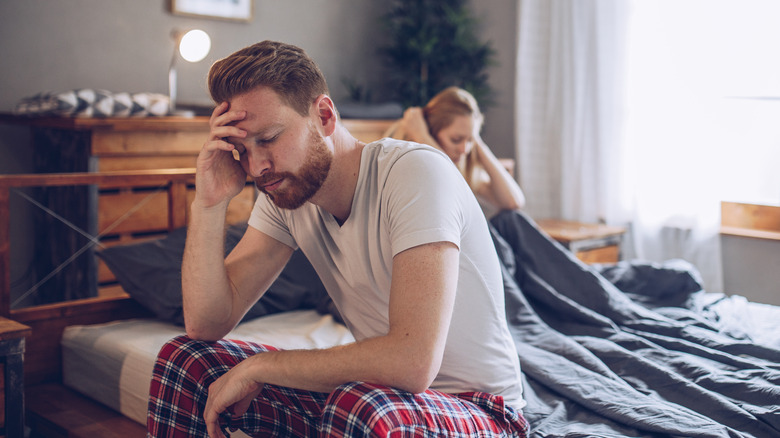At What Age Do Men Lose Their Sex Drive?
A man's libido, sex drive, or sexual appetite (whatever you want to call it) is determined by a lot of different factors. Your hormone levels, underlying health conditions, the fondness you feel for your partner, your mental health, the quality of your relationship, your diet, physical activity, stress, sleep, medications, smoking, and even how familiar you are with your partner may influence things in the bedroom.
It is no surprise that age comes into this list of factors too. Thanks to Hollywood movies, we're made (painfully) aware that the older you get, the less of a sex drive you might have. But what age are we talking about here, exactly? Is it the late 70s going into the 80s and 90s, or does it start declining as early as in your 30s? And do you ever lose it completely?
For starters, experts are careful not to define what's considered "normal" libido. That being said, there are a few different ideas surrounding when libido levels start going down; there is no one-size-fits-all answer. For instance, a 2017 study published in BMJ Open found that men experienced a decrease in sex drive between ages 35 and 44. However, a 2011 study published in the Indian Journal of Psychiatry found that men well into their 50s still showed sexual desire. What gives?
Men and sex drive: A nuanced phenomena
The sex hormone thought to be responsible for sexual appetite in men, testosterone, is highest in your 20s; after age 35, the levels may start to deteriorate. But this doesn't necessarily mean a decline or loss in sexual appetite will follow. Lower testosterone levels may not affect every man's sex drive the same way. In fact, it is not uncommon for men to maintain sexual appetite well into their 60s and 70s.
What men need to know about their sexual health as they age is that chronic health conditions, pain, and poor body image may also be at play. Your libido is tied to your overall health, after all. But if you've lost your sex drive, don't have any health conditions, and aren't bothered by this decline in appetite (or don't even notice it), most experts may tell you not to worry about it. What's considered low sex drive for someone else might be "normal" for you.
Contrary to what men may think, erectile dysfunction and loss of libido aren't one and the same thing, explained UCLA Health urologist Dr. Rajiv Jayadevan (via WebMD). Even though both can be caused by a complex mix of physiological, emotional, and mental factors, one doesn't necessarily cause the other. However, if a dry spell (caused by a loss of sex drive) is affecting you or your significant other, or if you think it might be owing to an underlying health condition, then it might be time to seek professional help.
How to handle low or loss of sex drive
Working with your partner and your healthcare provider can provide some answers. For example, if you think your relational needs aren't being met and you've stopped having sex, then it might be time to discuss that with your partner or even seek therapy. If you think stress or lack of sleep is causing the issue, perhaps it's time to try fixing those. Chronic stress has a way of affecting your hormones and, subsequently, your sex drive.
Your health as you age is one important area to look at. Your heart health is closely tied to your sexual health, for instance. Clogged arteries mean less blood flow to your body, including your nether regions. Men with diabetes might experience low libido as well, because of nerve damage, hormonal fluctuations, etc. Conditions like arthritis can also affect your libido by influencing your mood and overall wellbeing. Medications you're on to treat underlying health conditions can cause issues in the bedroom too; we're talking high blood pressure medications, SSRI antidepressants, heart failure pills, opioids, and cancer treatments.
If you think testosterone levels are the problem, you can get yours checked. "If it is testosterone that's the issue, we can give them the testosterone that their body's not producing," explained Cleveland Clinic men's sexual health specialist Dr. Petar Bajic (per WebMD). The important thing to remember is that there's no shame attached to any of it. Understanding the reasons for low sex drive is the first step. Then you can seek answers and solutions.



